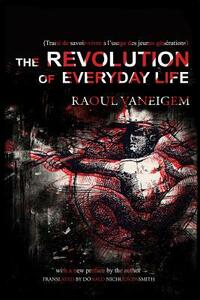You need to sign in or sign up before continuing.
Take a photo of a barcode or cover
A cornerstone of modern revolutionary thought and a surprisingly weighty node in a web of social critique. Sharp and full of love for everything what makes life worth living, not merely surviving.
slow-paced
I was drawn to the Revolution of Everyday Life largely for its title - the idea of a practical guide to resistance and revolutionary acts of freedom was very attractive to me, because of how hopeless a lot of modern marxist theory is, even if it contains excellent social analysis. However, this book doesn’t really do that - its more of a rambling, poetic explanation of Vanegeim’s situationist-adjacent brand of Marxism. Excellent deconstruction of the ways in which people are constrained by society (and how religion and capitalism effect that) sit side by side with exaggerated claims that make this feel less of a book and more of a lecture. I wish Vanegeim had expanded on the concrete ways people can resist “survival sickness” through love, friendship, play and revolution. The reversal of perspective portion of the book only takes up about a 1/3rd, and feels underdeveloped in comparison to the very thorough but somewhat unoriginal deconstruction of capitalism, even if Vanegeim brings a 60s french perspective to it that was in some ways ahead of its time when talking about the effects of technology on alienation and modern relationships. I like the uncomprimising combination of collectivism and individualism, and he is right to point it out as a byproduct of the false dichotomy created between authoritarian state socialism and market capitalism. However, when looking to the future, I find that his social analysis devolves into the kind of historical determinism (that the revolution will happen in the future without question) that he critiques, and ironically, despite his railing against the effects of christianity, resembles the christian mythology of rapture (+ the unitary triad). There are some beautiful and insightful passages in here, especially when he talks about the need to live authentically and grasp the present moment, but there is a lot of this which is extremely difficult to disentangle from needlessly dense exposition and a plethora of unexplained, out of date cultural references. Vanegeim is a better thinker than he is a writer, and while there are diamonds in the rough, it doesn’t quite live up to its reputation as an underlooked marxist classic, at least as a reading experience.
The Revolution of Everyday Life is a Situationist treatise that opposes Power, whether in capitalist or in authoritarian communist countries. In this review, I split the book into two parts: the first being the discussion of the problems within hierarchical structures with the power dynamics inherent in them; and the second, Vaneigem's proposals on the overturning of Power.
A problem I had throughout the book was that Vaneigem's writing was, if anything, too poetic, to the point of being sometimes unintelligible. Very often I find myself reading the same paragraphs over and over again without gaining any understanding of what he's trying to get across at. However, I have to mention that his ideas and observations in the first part were very astute and insightful, often able to strike at the heart of the problems.
The second part, I had greater disagreements with. In true Situationist fashion, Vaneigem asserts that the power of human subjectivity and creativity is the greatest weapon for the person in everyday life. He speaks of the development of the consciousness of our own free wills and the recognition of each others' creativity as something that would surely usher in a revolution that overturns Power. I feel like his optimism here is derived from a sincere belief in the destruction of current structures and conventions (which, curiously, includes the taboo of incestuous relationships), but I think his optimism is misplaced. However, despite so, even if you disagree with the overall sentiments, he has many insights in this part that unmasks the structures that we are subject to, and the tendencies we may have that have been caused by discontent with and conformity to current society (when we have partially identified the problems but are unwilling or unable to completely comprehend or do away with these structures and their indoctrination).
An advice for future readers that I have regretfully realised only towards the end of the book: don't worry if you don't understand what is written there, you shouldn't try to reread the same parts over and over again to try to glean some information off it. The writing sometimes is a bit too dense to penetrate, but he does repeat his points in multiple different ways that, at the end of the chapter, you would understand precisely what he was trying to tell you.
I'm not sure if this is due to the translation or the writer himself, but I do absolutely adore the summary blurbs at the start of every chapter that allows you to know exactly what to look forward to. They also help when you want to refresh your memory on chapters that you've read before.
I do believe that there is much to learn from this book, as insightful as it is inciteful. Incidentally, the (overly) poetic nature of his writing makes this book endlessly quotable.
A problem I had throughout the book was that Vaneigem's writing was, if anything, too poetic, to the point of being sometimes unintelligible. Very often I find myself reading the same paragraphs over and over again without gaining any understanding of what he's trying to get across at. However, I have to mention that his ideas and observations in the first part were very astute and insightful, often able to strike at the heart of the problems.
The second part, I had greater disagreements with. In true Situationist fashion, Vaneigem asserts that the power of human subjectivity and creativity is the greatest weapon for the person in everyday life. He speaks of the development of the consciousness of our own free wills and the recognition of each others' creativity as something that would surely usher in a revolution that overturns Power. I feel like his optimism here is derived from a sincere belief in the destruction of current structures and conventions (which, curiously, includes the taboo of incestuous relationships), but I think his optimism is misplaced. However, despite so, even if you disagree with the overall sentiments, he has many insights in this part that unmasks the structures that we are subject to, and the tendencies we may have that have been caused by discontent with and conformity to current society (when we have partially identified the problems but are unwilling or unable to completely comprehend or do away with these structures and their indoctrination).
An advice for future readers that I have regretfully realised only towards the end of the book: don't worry if you don't understand what is written there, you shouldn't try to reread the same parts over and over again to try to glean some information off it. The writing sometimes is a bit too dense to penetrate, but he does repeat his points in multiple different ways that, at the end of the chapter, you would understand precisely what he was trying to tell you.
I'm not sure if this is due to the translation or the writer himself, but I do absolutely adore the summary blurbs at the start of every chapter that allows you to know exactly what to look forward to. They also help when you want to refresh your memory on chapters that you've read before.
I do believe that there is much to learn from this book, as insightful as it is inciteful. Incidentally, the (overly) poetic nature of his writing makes this book endlessly quotable.
challenging
informative
inspiring
fast-paced
I don't understand why this book has garnered so many great reviews. I really don't. Honestly, I think that because he is using a much larger vocabulary than you would find in the typical Anarchist (or Situationist if you must) tract, that he is actually saying something worth hearing. Most of the great ideas you can find here are drawn almost whole cloth from either Marx (history/Marxism) or from Lefebvre (Anarchism/Situationism). Take that away and all you have remaining is one or two quotables buried deep inside steaming piles of... bombastically rhetorical nonsense.
I am reading a translation and maybe it is better in the original French. Also, I was born a decade after the '68 that would have made this book relevant. I'll be generous and round this up to two for the sake of that historical context. Sad thing is, you read some of his more recent interviews and the guy is still spouting the same nonsense. Apparently, in the past 50 years, he hasn't changed, matured, or developed his ideas beyond the junk you will read here. Maybe he was relevant once... I doubt it, but certainly, he is no longer so. This book belongs in a museum, not on my bookshelf.
I am reading a translation and maybe it is better in the original French. Also, I was born a decade after the '68 that would have made this book relevant. I'll be generous and round this up to two for the sake of that historical context. Sad thing is, you read some of his more recent interviews and the guy is still spouting the same nonsense. Apparently, in the past 50 years, he hasn't changed, matured, or developed his ideas beyond the junk you will read here. Maybe he was relevant once... I doubt it, but certainly, he is no longer so. This book belongs in a museum, not on my bookshelf.
Compared to The Society of the Spectacle, Revolution of Everyday Life is far more accessible, being less a theoretical critique of late capitalism and more a manifesto for revolution. That being said, Vaneigem's style, particularly in translation, is an acquired taste. If you happened to be steeped in the writing of left/radical French philosophers, sociologists, or critical theorists, then this is a "must read." Clearly tapping into the spleen & ennui of the existential mood of the late 60s, Vaneigem turns the source of existentialism away from some nebulous metaphysical source and redirects our attention to the real causes: the dehumanizing power of authoritarian bureaucracy and modern means of production.




